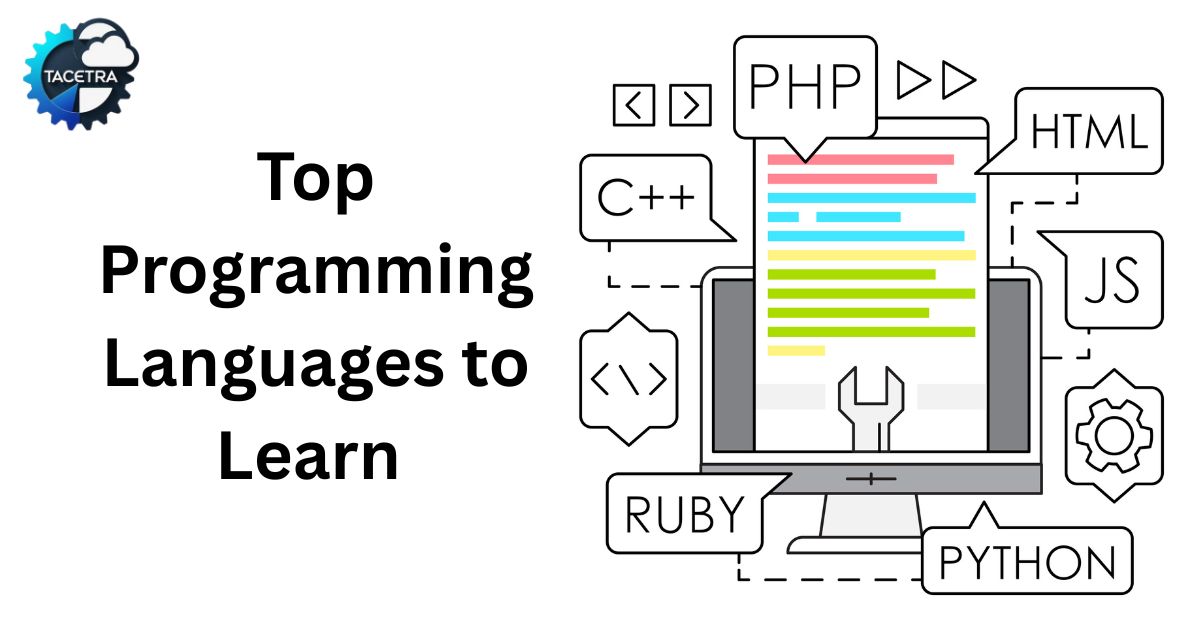Choosing the right programming languages to learn is one of the most important steps for any developer or aspiring coder. As technology evolves, new languages appear, but a handful of core programming languages continue to dominate across web development, data science, and the global job market. In 2025, the most widely used and in-demand programming languages remain JavaScript, Python, SQL, and Java, with TypeScript and newer options like Rust and Go gaining momentum.
According to the Stack Overflow Developer Survey 2025, JavaScript is still the most used programming language, with around 66% of developers worldwide reporting active use. Meanwhile, the TIOBE Index ranks Python as the number one language globally, cementing its role as the backbone of data science, AI, and automation.
A Quick History of the Leading Languages
JavaScript, created in 1995, began as a lightweight scripting tool but has grown into the foundation of modern web applications. Today it powers both front-end and back-end development through frameworks like React, Angular, and Node.js. Python, developed in 1991 by Guido van Rossum, was designed with simplicity and readability in mind. Its versatility made it the go-to language for artificial intelligence, machine learning, and big data.
Java, also launched in 1995, became famous for its “write once, run anywhere” philosophy and is still critical for enterprise systems and Android development. SQL, which originated in the 1970s, has remained indispensable for working with relational databases, and nearly every developer interacts with it at some point.
TypeScript, a newer entrant released by Microsoft in 2012, builds on JavaScript by adding static typing, making it increasingly popular for large-scale web projects.
Which Programming Languages Should You Learn in 2026?
If your goal is web development, JavaScript remains the number one skill to master. Surveys like Colorlib’s 2025 web development statistics show that over 65% of web developers rely Javascript. Pairing JavaScript with HTML, CSS, and SQL will ensure you can build both client-facing and database-driven applications.
For data science and AI, Python is essential, with NYIT reporting that nearly 90% of data professionals use it, followed closely by SQL for handling structured data. R is still relevant for advanced statistical work but less widely used than Python.
Finally, for career growth and job demand, focus on Python, JavaScript, and Java. According to Statista’s 2025 recruiter demand survey, these three consistently rank among the most requested skills in job postings worldwide.
| Language | Best For | Strengths | Limitations | Ideal If You Want To… |
|---|---|---|---|---|
| JavaScript | Web development (frontend & backend) | Runs in every browser, huge ecosystem, full-stack capable | Can become hard to maintain at scale without structure | Build websites, web apps, or interactive user interfaces |
| TypeScript | Large web applications | Strong typing, fewer runtime bugs, better for teams | Slight learning curve on top of JavaScript | Work on production-grade web apps or enterprise frontend projects |
| Python | Data science, AI, automation, backend | Easy to read, massive libraries, fast development | Slower performance for compute-heavy tasks | Work with data, machine learning, or rapid prototyping |
| Java | Enterprise software, Android apps | Stable, performant, widely used in large systems | Verbose syntax, slower to write | Build scalable, long-term applications in corporate environments |
| SQL | Databases and data analysis | Essential for data retrieval, universally used | Not a general-purpose programming language | Work with databases or analyze structured data |
| Go | Cloud services, backend infrastructure | Fast, simple, excellent concurrency support | Smaller ecosystem than older languages | Build scalable backend services or cloud-native apps |
| Rust | Systems programming, security-critical software | Memory-safe, high performance | Steep learning curve | Work on low-level, performance-sensitive systems |
The Future of Coding Languages
While Python, JavaScript, SQL, and Java dominate today, newer languages are steadily rising. Rust is gaining traction in systems programming and security-critical applications. Go, developed by Google, is becoming the language of choice for cloud services and backend infrastructure. Kotlin is popular in Android development and is slowly replacing Java in some mobile projects.
However, for most developers in 2025, learning and keeping up with the big four—Python, JavaScript, SQL, and Java—remains the smartest investment.
Which Programming Language Should You Learn?
Final Thoughts
In 2025, the programming languages that matter most are Python, JavaScript (and TypeScript), SQL, and Java. These are the languages that dominate global usage, power critical domains like web and data science, and continue to appear at the top of recruiter demand lists.
While it’s smart to keep an eye on emerging technologies like Rust and Go, investing your time in mastering these core languages will keep your skills relevant, your career future-proof, and your opportunities wide open.
FAQ: Programming Languages in 2026
What is the most popular programming, scripting or markup language?
The most widely used programming language is Javascript, followed by HTML/CSS and Python.
What is the easiest programming language to learn?
Python is widely considered the easiest for beginners due to its simple syntax and readability.
Which programming language pays the most?
While high-paying jobs often involve niche languages like Go, Rust, and Scala, the most stable and widely available jobs still revolve around Python, JavaScript, and Java.
Do I need to learn multiple programming languages?
Yes. Most professional developers work with two or three languages regularly, such as JavaScript for web, Python for automation, and SQL for databases.
Will AI replace the need for learning programming languages?
No. AI can assist developers, but a solid understanding of Python, JavaScript, and SQL ensures you can design, debug, and maintain robust systems.
Should I learn TypeScript instead of JavaScript?
It’s best to learn JavaScript first since it is foundational. TypeScript builds on it and is highly recommended once you are comfortable, especially for large-scale web projects.
Further Reading: Boost Developer Productivity with Clean Code Writing Tips
Discover more from TACETRA
Subscribe to get the latest posts sent to your email.
